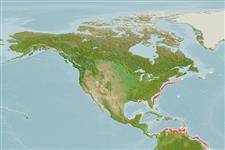Teleostei (teleosts) >
Anguilliformes (Eels and morays) >
Congridae (Conger and garden eels) > Congrinae
Etymology: Japonoconger: Composed from Japan + Latin, conger = conger (Ref. 45335); caribbeus: Named for the Caribbean Sea, the only place the species has been collected (Ref. 40828).
Environment: milieu / climate zone / depth range / distribution range
Ecology
Marine; bathydemersal; depth range 329 - 576 m (Ref. 40828). Deep-water
Western Central Atlantic: Caribbean coast of Colombia and Venezuela.
Size / Weight / Age
Maturity: Lm ? range ? - ? cm
Max length : 50.2 cm TL male/unsexed; (Ref. 40789)
Vertebrae: 160 - 166. Similar to Japonoconger sivicolus but with more head pores. Basic pattern of supratemporal pore seems to be a median pore flanked on each side by a pore midway to the lateral line and another pore immediately above the first lateral-line pore. Anomalies common, but no specimen less than four. Some specimens with one or two postorbital pores; Supratemporal pores show considerable variation, but no specimen has fewer than six.
Life cycle and mating behavior
Maturity | Reproduction | Spawning | Eggs | Fecundity | Larvae
Smith, D.G., 1994. Catalog of type specimens of recent fishes in the National Museum of Natural History, Smithsonian Institution, 6: Anguilliformes, Saccopharyngiformes, and Notacanthiformes (Teleostei: Elopomorpha). Smithson. Contrib. 566:50 p. (Ref. 40789)
IUCN Red List Status (Ref. 130435: Version 2024-2)
Threat to humans
Harmless
Human uses
Tools
Special reports
Download XML
Internet sources
Estimates based on models
Preferred temperature (Ref.
123201): 7.3 - 14.5, mean 10.3 °C (based on 13 cells).
Phylogenetic diversity index (Ref.
82804): PD
50 = 0.6250 [Uniqueness, from 0.5 = low to 2.0 = high].
Bayesian length-weight: a=0.00063 (0.00029 - 0.00138), b=3.18 (3.00 - 3.36), in cm total length, based on LWR estimates for this (Sub)family-body shape (Ref.
93245).
Trophic level (Ref.
69278): 3.9 ±0.5 se; based on size and trophs of closest relatives
Resilience (Ref.
120179): Medium, minimum population doubling time 1.4 - 4.4 years (Preliminary K or Fecundity.).
Fishing Vulnerability (Ref.
59153): Moderate vulnerability (40 of 100).
